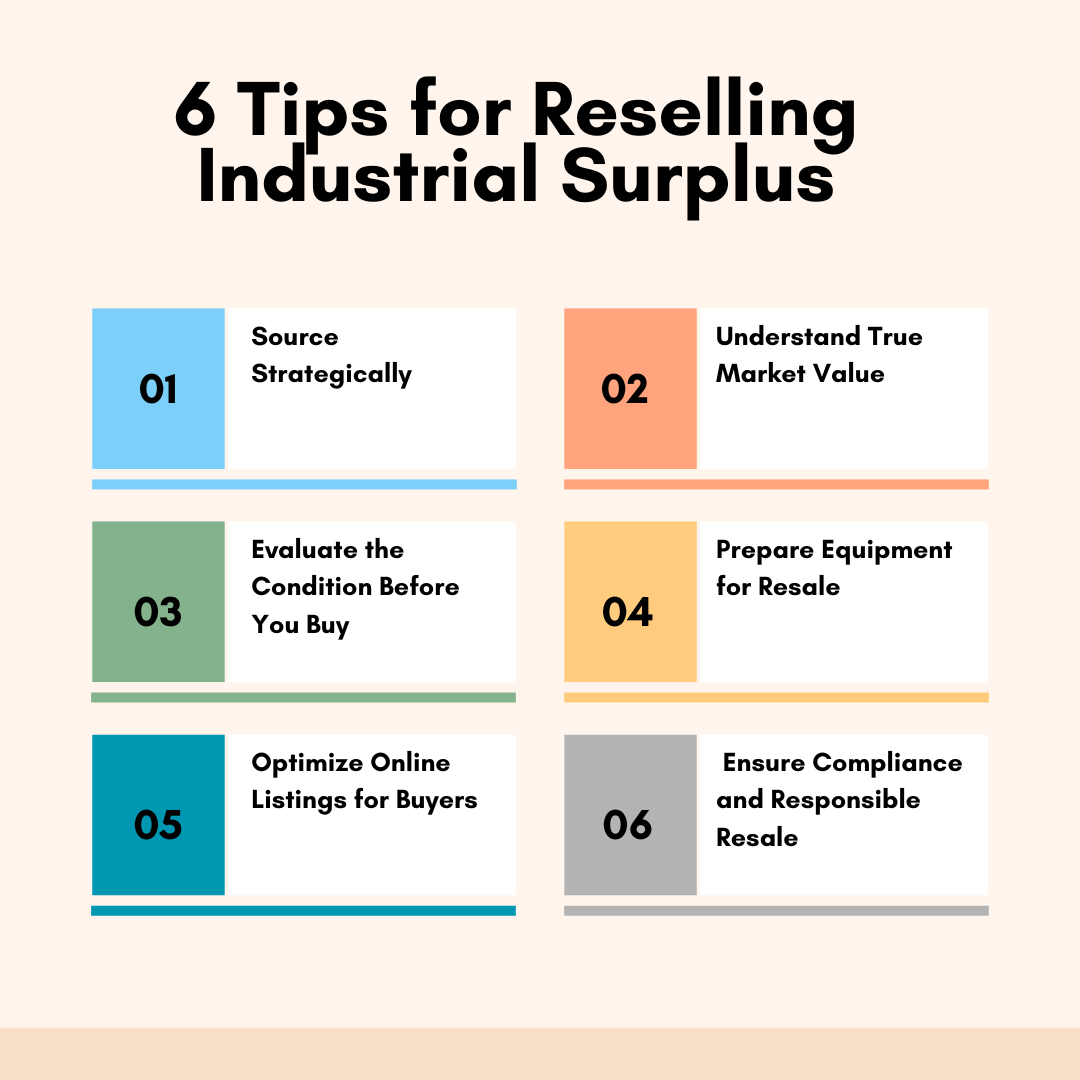6 Tips for Reselling Industrial Surplus for Profit

Industrial surplus refers to unused or excess machinery, spare parts, raw material, finished goods, or tools that still hold significant value. Many of these assets build up when businesses upgrade equipment, adjust production lines, or close projects. Often, this surplus equipment remains fully functional, underutilized, and ready for resale.
Both individuals and industrial liquidators can turn this surplus into profit by buying and then reselling through a structured plan.
While the scale of operations may differ, the objective remains the same: to recover asset value and achieve a fair return.
In this blog, I have shared six practical tips to help both individual surplus sellers and industrial liquidators to maximize returns from reselling industrial surplus.

Infographic outlining six practical tips for reselling industrial surplus profitably and responsibly.
Tip 1: Source Strategically
Reselling industrial surplus profitably starts with how and where you source it. The best opportunities often come from businesses consolidating, upgrading, or factory liquidations — where equipment still holds strong resale potential. Strategic sourcing ensures access to quality assets before they hit crowded public markets.
For Individual Sellers
To consistently find valuable surplus, focus on channels that provide reliability, traceability, and fair pricing:
- Attend local industrial auctions and follow plant closure events where equipment is sold below replacement cost.
- Build relationships with facility managers, contractors, and maintenance teams — they often look to offload usable surplus quickly.
- Track listings on trusted online platforms for short-term buying opportunities.
For Industrial Liquidators
Liquidators operating at scale require structured and repeatable sourcing pipelines:
- Develop direct procurement channels from decommissioned plants, manufacturing consolidations, and MRO liquidations.
- Partner with asset recovery and disposition firms that manage closed or private marketplaces and auctions for enterprise-grade surplus.
Tip 2: Understand True Market Value
Understanding the true market value of industrial surplus is critical to profitable resale.
Accurate valuation begins with assessing both market demand and physical condition. Not every surplus item is worth reselling — some “obsolete” parts are rare and valuable due to discontinued production, while others have no secondary market value. The key is distinguishing between the two before committing to a sale or purchase through proper valuation research.
Setting the right price determines how quickly assets move and how much value you recover. Price too high, and equipment sits idle; too low, and you lose margin.
For Individual Sellers
Before listing, research comparable sales across reliable platforms.
Use manufacturer part numbers (MPNs) or model identifiers to ensure your comparisons are accurate.
Focus your efforts on high-demand asset classes — motors, drives, control panels, pumps, and valves tend to hold value due to their widespread industrial use. Check whether similar items are actively trading or sitting unsold; this indicates real market velocity.
Also, factor in condition, brand reputation, and availability.
Parts that are obsolete yet in demand by older facilities can yield higher returns than newer but oversupplied models.
Note: Always balance pricing with how quickly you need to recover cash flow — precision in pricing creates predictable turnover.
For Industrial Liquidators
Liquidators operating at scale should rely on data benchmarking rather than anecdotal pricing.
Track recovery rates by asset category and resale velocity across your selling channels to determine optimal price bands.
By analyzing turnover time, demand cycles, and historical recovery margins, liquidators can prioritize inventory that delivers the strongest ROI and avoid overstocking slow-moving items.
Regularly update your pricing models to reflect shifts in commodity markets, supply chain disruptions, and OEM product cycles.
Tip 3: Evaluate the Condition Before You Buy
In surplus reselling, profitability starts with what you buy. Evaluating the condition before committing ensures that every purchase has resale potential and protects your margins from costly surprises.
For Individual Sellers
Before finalizing a purchase, take time to verify the physical and functional state of the equipment. A short checklist can help you avoid unnecessary risk:
- Inspect for visible damage such as cracks, corrosion, or missing components.
- Confirm functionality — ask if the item has been tested, calibrated, or certified operational.
- Request supporting documentation, including manuals, test records, or photos of operational use.
- Avoid untested or incomplete assets unless you have the capability to repair or refurbish them.
For Industrial Liquidators
When handling high-volume lots, structured evaluation is critical. Build standardized workflows to maintain consistency across thousands of SKUs:
- Implement inspection and testing protocols for each asset category.
- Assign traceability markers such as serial numbers, barcodes, or condition codes.
- Maintain detailed inspection records to support pricing accuracy and compliance audits.
- Segregate defective or unverified items early to prevent value dilution in resale lots.
Tip 4: Prepare Equipment for Resale

Well-prepared equipment attracts more buyers, sells faster, and often commands a higher price. Clean, documented, and ready-to-use assets make a strong impression in any resale market.
For Individual Sellers:
Presentation plays a big role in attracting serious buyers. Before listing any item, give it a proper cleaning so it looks well-maintained and ready for use.
If you still have manuals, receipts, or maintenance records, include them. These small details can make your equipment stand out and justify a better price.
Take time to fix simple issues, such as replacing worn parts or tightening loose fittings. Minor repairs often lead to a noticeable increase in resale value and help close deals faster.
For Industrial Liquidators:
Similarly, for liquidators, professional preparation is key to maximizing asset value. Equipment that looks clean, organized, and well-documented attracts more buyers and sells faster.
Start with a full cleaning and inspection to ensure every asset is safe, compliant, and ready for resale. Verifying operational readiness through testing or certification adds confidence for potential buyers.
Keep all documentation and maintenance logs in order so buyers can easily review the equipment’s history and condition.
A consistent presentation across listings creates a professional image and helps command stronger prices.
Tip 5: Optimize Online Listings for Buyers
Once you’ve secured quality surplus, it’s time to focus on presentation — this is where profit starts to materialize. For sellers operating online, a well-optimized listing bridges the gap between inventory and income, ensuring your equipment stands out to serious buyers and converts faster.
For Individual Sellers
To capture attention in crowded marketplaces, make every listing detailed, accurate, and visually clear:
- Include full model numbers and specifications — most buyers search by exact part identifiers.
- Add high-quality, multi-angle photos showing serials, labels, and overall condition.
- Write factual descriptions that focus on performance, compatibility, and application.
- Disclose condition and testing details — clearly state if the item is used or refurbished.
For Industrial Liquidators
At scale, consistency is the foundation of professional resale operations. To maximize listing efficiency and search visibility online:
- Standardize metadata — include SKU, manufacturer, condition, and storage location for every item.
- Use structured templates to streamline multi-platform uploads and maintain uniform quality.
- Embed structured data to improve discoverability and support analytics for pricing optimization.
Tip 6: Ensure Compliance and Responsible Resale
Compliance is non-negotiable in industrial resale. Selling restricted or misclassified items can expose you to financial penalties, legal issues, or damage to your professional reputation. Responsible resale protects both your business and your buyers.
For Individual Sellers
Before listing or shipping surplus items, confirm that everything meets safety and regulatory standards:
- Avoid restricted or hazardous materials, such as chemicals, pressurized tanks, or electronics with safety concerns.
- Remove identifiable branding, logos, or serials if required to maintain confidentiality.
- Verify buyer eligibility for specialized or export-controlled components.
- Use certified recycling or scrap channels for non-compliant or unsafe assets.
Taking these precautions builds trust and prevents issues that could halt sales or invite regulatory attention.
For Industrial Liquidators
Compliance obligations scale with volume. To ensure transparency and accountability across high-value or cross-border transactions:
- Adhere to trade, export, and environmental regulations in all resale activities.
- Maintain audit-ready documentation covering resale, recycling, and scrap disposition.
- Ensure traceability for every item through serial tracking and buyer verification.
- Partner only with vetted, compliant buyers who meet your industry and jurisdictional standards.
Source Verified Industrial Surplus with Amplio
Access Enterprise-Grade Surplus with Verified Appraisal
Amplio gives industrial liquidators access to high-quality surplus directly from enterprise facilities across manufacturing, energy, and logistics sectors. Every item undergoes AI-powered appraisal and expert validation before being listed — ensuring accurate valuation, full documentation, and resale-ready condition.
Buy from a Trusted Private Marketplace
Amplio’s private marketplace connects you with appraised industrial surplus. We also ensure that every transaction happens in a controlled, transparent environment, ensuring you buy authentic and quality industrial surplus.
Simplified Logistics
We coordinate packing, shipping, and rigging for heavy or bulk assets, working directly with facility teams to ensure safety and compliance. You get predictable, low-friction logistics from purchase to delivery — no need to arrange third-party freight.
Compliance and Full Transaction Visibility
Every sale through Amplio meets trade and financial compliance standards. Detailed documentation and audit-ready records give you confidence and credibility when reselling to your own clients.
Join Amplio as a buyer today and gain access to verified, enterprise-grade surplus from trusted industrial sellers. Discover better margins, faster turnover, and a steady pipeline of resale-ready inventory.